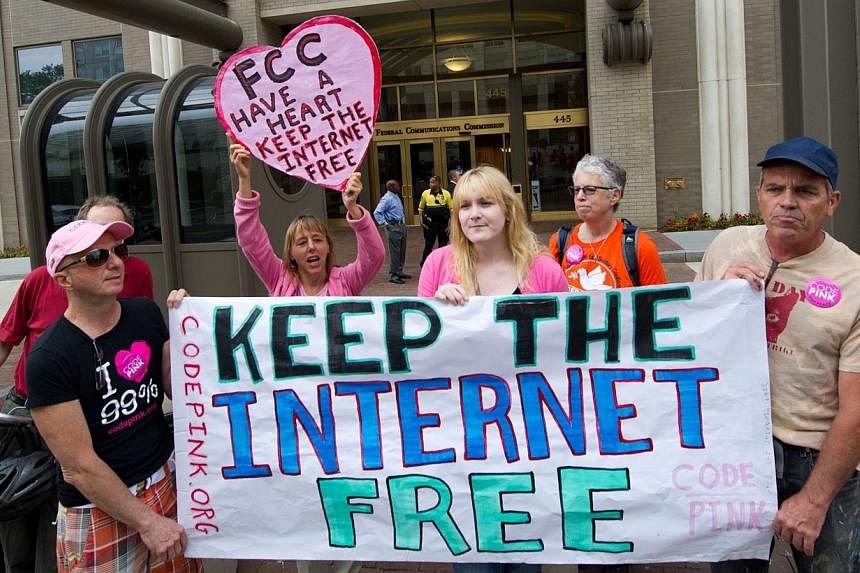US President Barack Obama stunned the telecom industry earlier this month by proposing that Internet service providers (ISPs) come under stricter regulation to make sure they grant equal access to all content providers, as a way to preserve "net neutrality".
Major industry players were up in arms over the proposal, with some threatening to take the issue to court.
What exactly is net neutrality and why is it such a hot-button issue?
We break down the debate in eight points:
Q1: What is net neutrality?
Net neutrality is the principle that all content providers should have equal access on networks. This means that ISPs will be barred from charging content companies for faster connection - or "fast lanes" - to ensure that their websites and applications load smoothly and swiftly.
It also means that no service should be stuck in a "slow lane" because the content provider does not pay a fee.
The term was coined in a 2003 law journal by Columbia law professor Tim Wu.
The issue was a platform in US leader Barack Obama's 2008 presidential campaign. Bringing up the topic earlier this month, Mr Obama said upholding the principle would ensure that "neither the cable company nor the phone company will be able to act as a gatekeeper, restricting what you can do or see online".
Q2: How can net neutrality be achieved, according to Mr Obama's plans?
Currently, broadband providers are classified as "information services", which are not obligated to provide the same service to everyone.
Mr Obama proposed reclassifying consumer broadband as a public utility - like electricity and telephone service - which would allow the Federal Communications Commission (FCC) to set precise rules on quality of service, including banning what is known as "paid prioritisation", ie. ISPs charging content providers for speedier access.
For years, consumer advocates in the US have pressed the FCC to reclassify broadband as a telecoms service as a way to have more oversight authority. ISPs, however, have pledged they would fight the matter in court.
Q3: Are content providers in the US already paying ISPs for fast lanes?
ISPs said they have not and will not strike paid prioritisation deals.
The most notable instance of anything resembling paid prioritisation is Netflix's payment to Comcast, Time Warner Cable, AT&T and Verizon to ensure its shows flowed smoothly on their pipes, reported the New York Times. Netflix accused the broadband providers of slowing its content on purpose to get paid.
ISPs have also been sued in the past for artificially limiting the speed of customers who use peer-to-peer software like BitTorrent.
Q4: Why are players in the telecoms industry bristling at Mr Obama's proposal?
Their argument is that some streaming services like Netflix and Hulu take up huge bandwidth and hence should bear some of the cost of handling heavy traffic. They also want flexibility on how to package and sell Internet services, given that they have invested hundreds of billions of dollars into building the network infrastructure.
Q5: What's the counter-argument?
Advocates of net neutrality say that allowing ISPs to charge for fast lanes would stifle innovation and competition because new startups would not be able to compete with big companies that could afford to pay for faster services.
Some also argue that if consumer broadband is left unregulated, companies that control access to the Internet would have enormous power to determine what information reaches the public online.
Q6: What's the response from the telecoms industry so far?
Immediately after Mr Obama's statement, shares of some of the ISPs dropped, including Comcast Corp. and Time Warner Cable Inc.
If lobbying the FCC fails, they could turn to a legal fight in a court that in the past has been favourable for the industry. In January this year, the ISP Verizon successfully challenged a set of FCC regulations designed to implement net neutrality standards. A D.C. court gave Verizon's broadband Internet service the leeway to disregard FCC rules regarding the blocking and/or "unreasonable discrimination" of Internet traffic.
Experts were split on whether the Obama administration or the telecoms industry would prevail in court. Much depends on the wording of the rules, which the FCC has not written.
The industry could also appeal to regulation-averse congressional Republicans to intervene.
Q7: Is it a done deal?
While Mr Obama's statement indicates political pressure, the FCC is not obliged to act on Mr Obama's proposal, even though its commissioners are politically appointed. There is no deadline for the FCC to act.
Q8: Is net neutrality an issue in other countries?
Yes. For instance, European Union lawmakers voted in April for strict net neutrality rules that barred telecom operators like Orange and Telefonica from prioritising some internet traffic over others.
But the latest draft of the reform proposal obtained by Reuters this week shows that member states are leaning towards a looser approach which only bars ISPs from applying measures which "block, slow down, alter, degrade or discriminate against specific content".
Source: Reuters, New York Times, Bloomberg, gawker.com

